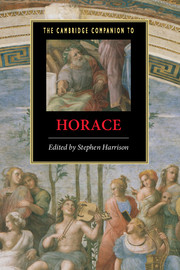Introduction
Published online by Cambridge University Press: 28 May 2007
Summary
This volume
The last major synoptic treatment of Horace’s whole poetic output was Eduard Fraenkel’s Horace (1957). A half-century later, the current Companion cannot hope to rival Fraenkel’s volume in substance, individuality and consistency of vision, but its form of twenty-four chapters by twenty-one different scholars reflects the increased specialism and diversity of modern Horatian scholarship. A vast variety of topics in Horatian studies is investigated in detail in the more than one hundred items on the poet now appearing annually according to the records of L'Année Philologique, and it is arguably no longer possible for a single scholar to command the whole range of arguments and issues. Nor is this volume exhaustively encyclopaedic, in the manner of the splendid Enciclopedia Oraziana (Mariotti 1996-8), perhaps the most valuable product of the bimillennium of Horace’s death, to which much reference is made in our individual chapters. This Companion aims to give a lively survey of the state of play in Horatian studies in the first decade of the twenty-first century in a manner which will be useful to students and scholars in other disciplines as well as to scholars working in the field of Horace.
The structure of the volume begins with ‘Orientations’, which set the background for Horace’s poetic achievement. We commence in conventional style from the poet’s biography. In chapter 1, Robin Nisbet gives us what can be known or inferred about Horace’s life and career, information which is gathered almost wholly from his poems; in chapter 2, Stephen Harrison duly reminds us that poetry is not always a straightforward autobiographical source, and that Horace’s self-presentation can be fantastic and conventional as well as realistic.
- Type
- Chapter
- Information
- The Cambridge Companion to Horace , pp. 1 - 4Publisher: Cambridge University PressPrint publication year: 2007

